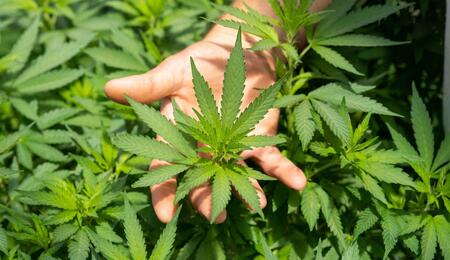Lab Study: Cannabis and Corona

Components in cannabis may prevent the coronavirus from entering healthy cells, claims a lab study issued in the Journal of Natural Products. The study, conducted by researchers at the University of Oregon, suggests that two cannabinoid acids commonly found in hemp varieties — CBGA and CBDA — can counteract the virus.
CBGA is short for cannabigerolic acid, and CBDA is for cannabidiolic acid. These two compounds were reportedly found to bound themselves to protrusions of protein parts on the virus and blocked a substance that the pathogen uses to spread infection in humans. The scientists ran lab tests with the alpha and beta variants of the virus, however, they did not carry out human studies.
Cannabinoid acids such as CBGA and CBDA are found in fresh cannabis plants. These are the pre-forms of CBG and CBD, or the chemical signatures of the two cannabinoids before decarboxylation. CBG is a minor cannabinoid, which shows medical promise for treating glaucoma, blood pressure, and neuroregeneration. CBD is the more famous cannabinoid and has numerous applications in medicine already, notably with the treatment of anxiety, mood disorders, and pain management.
Blinding the spike protein, CBGA and CBDA can prevent the novel coronaviruses from entering cells and causing infection, potentially offering new means of how to approach disease treatment.
"Orally bioavailable and with a long history of safe human use, these cannabinoids, isolated or in hemp extracts, have the potential to prevent as well as treat infection by SARS-CoV-2," the researchers wrote in the study abstract.
The study was led by Richard van Breemen, a researcher affiliated with the Oregon State's Global Hemp Innovation Center in the College of Pharmacy and Linus Pauling Institute, alongside scientists at the Oregon Health and Science University.
The researcher discussed that the cannabinoids target the same spike protein part of the virus as Covid-19 vaccines and antibody therapies. The spike protein is one of several protein structures that researchers take as targets when developing drugs to prevent Covid-19.
"Any part of the infection and replication cycle is a potential target for antiviral intervention, and the connection of the spike protein's receptor binding domain to the human cell surface receptor ACE2 is a critical step in that cycle," van Breeman said in media statements.
"That means cell entry inhibitors, like the acids from hemp, could be used to prevent SARS-CoV-2 infection and also to shorten infections by preventing virus particles from infecting human cells. They bind to the spike proteins so those proteins can't bind to the ACE2 enzyme, which is abundant on the outer membrane of endothelial cells in the lungs and other organs."
Van Breeman added: "Resistant variants could still arise amid widespread use of cannabinoids but that the combination of vaccination and CBDA/CBGA treatment should make for a much more challenging environment for SARS-CoV-2."



